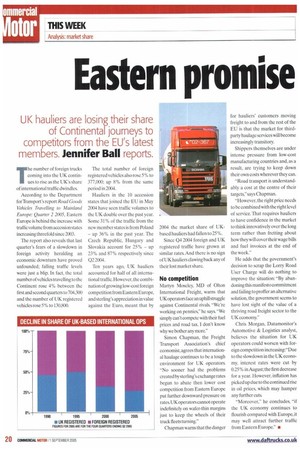Eastern promise
Page 20

If you've noticed an error in this article please click here to report it so we can fix it.
UK hauliers are losing their share of Continental journeys to competitors from the EU's latest
members. Jennifer Ball reports.
The number of foreign trucks coming into the UK continues to rise as the UK's share of international traffic dwindles.
According to the Department for Transport's report Road Goods Vehicles Travelling to Mainland Europe: Quarter 2 2005, Eastern Europe is behind the increase with traffic volume from accession states increasing threefold since 2003.
The report also reveals that last quarter's fears of a slowdown in foreign activity heralding an economic downturn have proved unfounded; falling traffic levels were just a blip. In fact, the total number of vehicles travelling to the Continent rose 4% between the first and second quarters to 704,300 and the number of UK registered vehicles rose 5% to 130,800. The total number of foreign registered vehicles also rose 5% to 377,000; up 8% from the same period in 2004.
Hauliers in the 10 accession states that joined the EU in May 2004 have seen traffic volumes to the UK double over the past year. Some 31% of the traffic from the new member states is from Poland — up 36% in the past year. The Czech Republic, Hungary and Slovakia account for 25% — up 23% and 87% respectively since 022004.
Ten years ago, UK hauliers accounted for half of all international traffic. However, the combination of growing low-cost foreign competition from Eastern Europe, and sterling's appreciation in value against the Euro, meant that by 2004 the market share of UKbased hauliers had fallen to 25%.
Since 042004 foreign and UK registered traffic have grown at similar rates. And there is no sign of UK hauliers clawing back any of their lost market share.
No competition Mar t)o Moseley, MD of Olton International Freight, warns that UK operators face an uphill struggle against Continental rivals. "We're working on pennies," he says. "We simply can't compete with their fuel prices and road tax. I don't know why we bother any more."
Simon Chapman, the Freight Transport Association's chief economist, agrees that international haulage continues to be a tough environment for UK operators. "No sooner had the problems created by sterling's exchange rates begun to abate then lower cost competition from Eastern Europe put further downward pressure on rates. UK operators cannot operate indefinitely on wafer-thin margins just to keep the wheels of their truck fleets turning."
Chapman warns that the danger for hauliers' customers moving freight to and from the rest of the EU is that the market for thirdparty haulage services will become increasingly transitory Shippers themselves are under intense pressure from low-cost manufacturing countries and, as a result, are trying to keep down their own costs wherever they can.
"Road transport is understandably a cost at the centre of their targets," says Chapman.
"However, the right price needs to be combined with the right level of service. That requires hauliers to have confidence in the market to think innovatively over the long term rather than fretting about how they will cover their wage bills and fuel invoices at the end of the week."
He adds that the government's decision to scrap the Lorry Road User Charge will do nothing to improve the situation: "By abandoning this manifesto commitment and failing to proffer an alternative solution, the government seems to have lost sight of the value of a thriving road freight sector to the UK economy."
Chris Morgan, Datamonitor's Automotive & Logistics analyst, believes the situation for UK operators could worsen with foreign competition increasing: "Due to the slowdown in the UK economy, interest rates were cut by 0.25% in August:the first decrease for a year. However, inflation has picked up due to the continued rise in oil prices, which may hamper any further cuts.
"Moreover," he concludes, "if the UK economy continues to flourish compared with Europe, it may well attract further traffic from Eastern Europe." o




































































































































































































